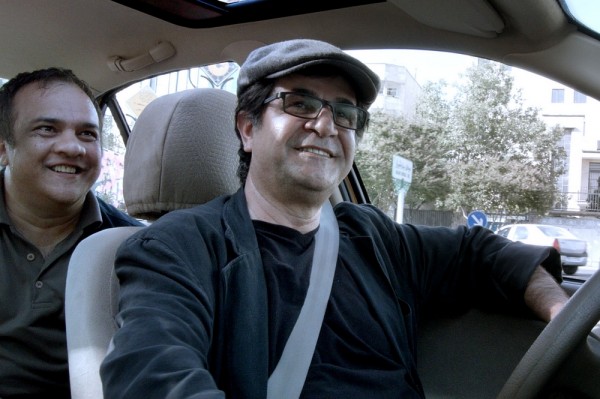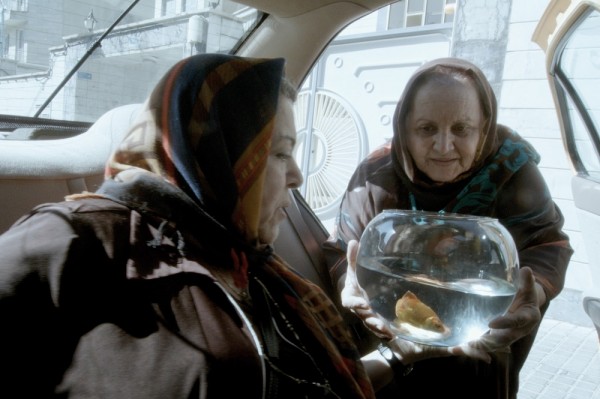To say that Jafar Panahi would do anything for cinema’s sake and liberty of speech is an understatement. Taxi is his 8th movie, and the third released illegally after the Iranian government banned him from making movies. We follow Panahi as a one-day taxi driver, driving through Tehran, meeting people from all means of life. Panahi has always been very critical of his country especially when it deals with the cinema industry.
Throughout his journey across Tehran, Panahi encounters many colorful people, from the dwarf with the pirated movies, to a husband and his wife after they had an accident, or two elderly ladies desperately trying to release their fishes into the sea before noon. All are trying to tell us, the audience, something important about limits on freedom of speech in a country that dictates what makes a movie watchable and releasable in Iran. It’s Panahi’s niece that lists restrictions that make a movie publishable. If a movie is too political or shows something the Iranian government doesn’t judge suitable, the filmmaker can go to prison on the grounds of propaganda against the Iranian government. Even if filmmakers don’t always follow the rules, they are not free to make movies on any subject they want.
Taxi is filmed like a documentary, and Panahi always chooses inexperienced actors, which gives a more realistic look to the situation. Panahi denounces many bans related to cinema, and even depicts his own situation through the story told by the lady with the roses (being arrested because the subject of one’s movie or other is too controversial and deemed dangerous for the country). There’s also a really interesting section on what you can show and what people actually think. The government can try to control the media, but the people themselves think in a different way. There’s a whole traffic of foreign movies and tv shows that are censored on Iranian ground between cinema lovers or students and resellers. There’s also a banalization of violence in words or in actions: the violence in real life is hidden from the screen. Religion is also central to Taxi, as it is one of the main reasons why there are restrictions on movie making in Iran.
Panahi is a member of the audience in his film. He always stays distant, he asks some questions, but mostly he stays detached from the people in his back or front seats. He’s the cameraman, moving around the cameras fixed on top of his dashboard and even occasionally filming on an iPhone. Panahi says what he wants to say through these people. You can see that he loves his country, otherwise he would have stopped making films a long time ago and would have just left. There’s a desire to make things change in one’s own country, and it’s that message that is important here, and the fact that we’re able to see it even with the ban still in place is great. He’s not giving up on his own country and will continue to raise questions that could one day maybe make a difference.
However, there is a limit to Taxi. You need to be a public that knows of Panahi to understand this film. My parents went to see it and didn’t quite get it, they thought it was too long and for many of the points raised, they couldn’t quite grasp why it was important, and it’s mostly because it’s very closely linked to his own life and past.
Taxi still depicts a very interesting view of the Iranian film industry, which is actually very flourishing. I would strongly recommend Taxi, if you’re willing to do a little bit of a background check on Panahi’s life first.
Rating: 4/5



